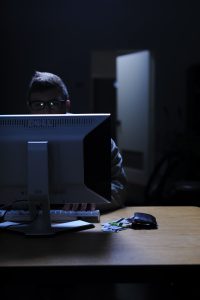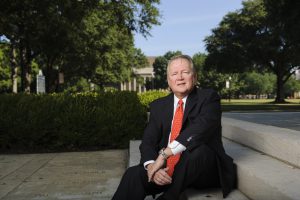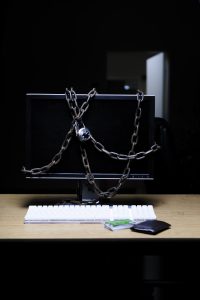By Bobby Mathews
Photos by Jeff Hanson

Open an email from your bank. Or, at least you think it’s your bank. Click a link to reset a password. In seconds, your bank account is drawn down to the last penny. The dollars disappear into cyberspace, as if they’d never been there at all.
That’s not a dream. It’s not the plot to a bad movie. It’s a reality for thousands of people who fall for “phishing” scams—and it’s just one small peek into the field of cyber security.
It’s a brave new world out there—one dominated by binary language, servers, networks, programmers, system admins, cons, crooks and grifters. But cyber crime isn’t the only danger out in the World Wide Web.
With the United States’ national security, economy and critical infrastructure coming to rely more and more on digital technology, The University of Alabama is working to position itself as a global leader in the field of cyber technology.
UA’s newly launched Cyber Institute is pursuing an interdisciplinary approach to cyber technology and safety by leveraging partnerships between the colleges of Arts and Sciences and Engineering and the Culverhouse College of Commerce.
“The Institute is a facilitating element, an umbrella that brings research elements together,” says Reg Hyde, director of the Cyber Institute. “This is not about building empires, hiring large numbers of people or acquiring turf. This is about where we’re going as a technological society, how we can leverage that technology in a positive way and how we can mitigate potential safety and security risks posed by that technology.”

The Cyber Institute will partner with UA’s social sciences programs through a collaborative effort with its engineering, law and business expertise.
“We’re trying to take a matrixed approach to the larger problem of cyber security,” Hyde says. “We want to help integrate the University’s existing areas of expertise and create our own specialty areas of research to allow The University of Alabama to lead in the future.”
As a former CIA operations officer and a deputy undersecretary of defense for intelligence and security in the U.S. Department of Defense, Hyde has seen how the country—from the government on down to the individual—has come to rely on tech, especially over the last two decades.
 “It’s changed, for better and for worse,” Hyde says. “We have devices that can do all sorts of things for you and are a tremendous benefit to us. Our cyber security is the backbone of our economy, healthcare, government and technology. But, you also have the ‘for worse’ part. Cyber crime is the most profitable type of crime today. We lose an estimated $450 billion to $1 trillion a year through cyber crime, and national security breaches occur daily.”
“It’s changed, for better and for worse,” Hyde says. “We have devices that can do all sorts of things for you and are a tremendous benefit to us. Our cyber security is the backbone of our economy, healthcare, government and technology. But, you also have the ‘for worse’ part. Cyber crime is the most profitable type of crime today. We lose an estimated $450 billion to $1 trillion a year through cyber crime, and national security breaches occur daily.”
Hyde was the right choice to lead the Institute, says Dr. Carl A. Pinkert, UA vice president for research and economic development.
“The Cyber institute and Reg Hyde’s leadership will propel not only the University’s priorities but our collaborative interactions across our state and nationally,” Pinkert says.
UA plans to collaborate with other universities in the state—as well as the government and private sector—to make the state a center for cyber technology.
The Institute will partner with corporations, other academic and research institutions and state and local governments in order to be on the cutting edge of cyber technology.
If leveraged correctly, that would attract businesses that can provide high tech jobs for Alabamians as well as for graduates of the University and other universities in the state.
